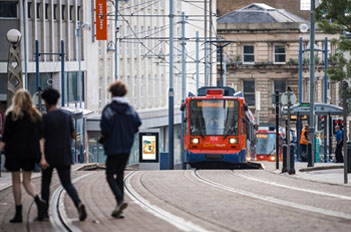A new report argues that metropolitan transport authorities have an integral role to play in responding to the global climate crisis by reducing emissions from transport systems and increasing their resilience.
The Urban Transport Group said the report, written by director Jonathan Bray for global public transport body UITP, shows how existing and new transport authorities can deliver on the carbon reductions and air quality improvements required from transport as part of wider city region and national government targets.

Sheffield, March 2022
The report says they can do this by investing in low and zero emission vehicle fleets and the supporting infrastructure; generating or purchasing green energy to power public transport fleets; promoting modal shift from the most polluting and carbon intensive transport modes; and improving the resilience of cities to the more extreme weather conditions that climate change is bringing.
Mr Bray said: ‘Given the huge and complex transport challenges that metropolitan areas around the world are facing, many are looking at how they can plan and operate transport in the future in a more co-ordinated way. I hope this report can help provide an accessible and non-technical guide to the benefits of metropolitan area transport authorities as well as the issues around establishing them and the options for the different forms they can take.
‘Although no one size fits all, and all governance is fluid, I strongly believe that transport authorities are a key building block for a better future for metropolitan areas.’
Mohamed Mezghani, secretary general of UITP, said: ‘Public transport will be vital to the recovery of the economy and society in a post-COVID 19 world and in combatting climate change. However, these objectives will not be possible without the planning and organisation of strong transport and mobility authorities. They are key in ensuring that public transport services are provided with public policy goals in mind whilst also considering citizens’ expectations.’
The report argues that transport authorities need to strike the right balance in a number of trade-offs:
- spending available resources on maintaining existing infrastructure and expanding that infrastructure
- facilitating different types of journeys made by different types of people
- funding raised from the users of public transport networks and funding raised from taxation and by other means
- competition and regulating in the public interest.
It also identifies four key contemporary challenges for urban transport governance:
- making timely decisions on how best to reduce carbon emissions whilst improving climate resilience
- realising the consumer benefits of new technologies, new mobility formats and business models whilst at the same time protecting the wider public interest
- balancing the need to improve the quality of place with providing access to those places
- ensuring that transport authority governance reflects the full diversity of the places it serves in the way it works and in the decisions it takes.
Register now for full access
Register just once to get unrestricted, real-time coverage of the issues and challenges facing UK transport and highways engineers.
Full website content includes the latest news, exclusive commentary from leading industry figures and detailed topical analysis of the highways, transportation, environment and place-shaping sectors.
Use the link below to register your details for full, free access.
Already a registered? Login